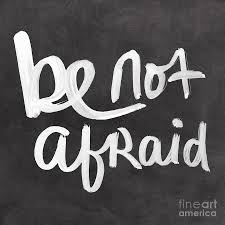Be Not Afraid
“Hurricane Fay to fade, but Gonzalo waits in the wings.”
My home page opens to NBC News, and this is the latest headline. If we are disappointed that Fay has faded, it means to say, there is yet more to worry about. Ganzalo waits in the wings.
Polls show that Americans are increasingly afraid. We are worried about Ebola, about ISIS. These are serious threats. If I were living in the Dallas neighborhoods where health officials came door to door handing out information on Ebola symptoms, I would be afraid for myself and my loved ones. That’s only natural. What we must hope for—pray for—is the gift of love. Love is what enables us to withstand the initial wave of fear, to know what we are feeling, to name it, and to know that there is another response. We can choose to love.
Without love our fears come to define us. We can only be selfish. Our only real concern is to protect ourselves and our own—the people and things that belong to us. Love enables us to care about others, the weakest and most vulnerable, the ones who are not our own (or at least we did not think they were until we met them). Fear paralyzes us within the prison of the small self; love frees the great God-Self within us to step out, to act, to embrace, heal, encourage, support, to weep with those who weep and laugh with those who laugh.
On this account Parker Palmer is so wise. He takes that spiritual admonition, “be not afraid,” and says, It’s natural to have fears, but do not become your fears. Don’t let them race through your body and soul, pushing out all love and compassion, all peace and joy. Be not afraid.
Anyone who seeks to live in love must recognize that the world around us is peddling fear every hour of the day and night. Our only hope lies in some practice of quietness, opening the heart, getting our bearings, remembering our true identity. Then we can hear the voice of love assuring us over and over again, “be not afraid.”

This fits in well with our discussion at E-100. “What constitutes a neighbor” was the question. We had many disparate answers to that question (“the world, my physical neighbors,” etc) but most importantly it made us all think about the question and was so good to hear different perspectives. Is ISIS our neighbor? Wow.
This reminds me of the difference between the French and English languages in how they talk about emotions. In French is it, “j’ai peur,” which means “I have fear.” In English we essentially say we *are* fear. Big difference!
Such good words, David. And when you consider that focusing on fear increases the fear, that’s all the more reason to “fear not”. I take this is both as an act of the will and an act of faith.